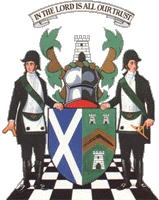


| Review | 
|
(Sub-title, `The Lost Secrets of Freemasonry').
by John J. Robinson.
Published by Century, 376 pages, £14.99.
It would seem that almost as many non-masons as members of the Craft have written books on Freemasonry in the last few years. This is yet another such publication but it differs from others in that Mr Robinson is an American non-mason who set out to research the Peasants Revolt of 1381 in England and came to the conclusion that it was not a spontaneous uprising but that a secret society must have organised it. This led to the possibility that the outlawed Knights Templar were responsible and the author followed this up by 'proving' that, since they required to work in secret whereas stonemasons did not, they are the founders of Freemasonry. As an elaborate cover-up the Templars are assumed to have adopted passwords and recognition signs which would have appeared to be connected with the respectable trade of stonemasons - Cathedral builders were not under threat and had no need to maintain secret codes.
in the last few years. This is yet another such publication but it differs from others in that Mr Robinson is an American non-mason who set out to research the Peasants Revolt of 1381 in England and came to the conclusion that it was not a spontaneous uprising but that a secret society must have organised it. This led to the possibility that the outlawed Knights Templar were responsible and the author followed this up by 'proving' that, since they required to work in secret whereas stonemasons did not, they are the founders of Freemasonry. As an elaborate cover-up the Templars are assumed to have adopted passwords and recognition signs which would have appeared to be connected with the respectable trade of stonemasons - Cathedral builders were not under threat and had no need to maintain secret codes.
 It is pointed out that the Knights Templar spoke Norman French and that various words and phrases still used can be traced to them. For example, he cites the words 'due guard' as being derived from the knightly 'Geste du Garde' which means a protective gesture; that the 'free' in 'Freemason' comes from the french 'frere' and the brother monks addressed each other thus. He also points out that the Templars wore a sheepskin girdle as a symbol of chastity.
It is pointed out that the Knights Templar spoke Norman French and that various words and phrases still used can be traced to them. For example, he cites the words 'due guard' as being derived from the knightly 'Geste du Garde' which means a protective gesture; that the 'free' in 'Freemason' comes from the french 'frere' and the brother monks addressed each other thus. He also points out that the Templars wore a sheepskin girdle as a symbol of chastity.
On the subject of the 'ancient penalties' he propounds the theory that they originated in the tortures which the Templars suffered if caught.
 Mr Robinson goes out of his way to give credit to the craft for its charitable works and moral teachings in present-day freemasonry and he condemns the anti-masonic conclusions of Stephen Knight in 'The Brotherhood'. However in his attempt to be knowledgeable on matters of ritual he appears to have relied on 'exposures' which are not accurate and this detracts from his credibility - although as a non-mason he had little option. Nevertheless this is an interesting and thought-provoking work, whether it is regarded as fiction or fact.
Mr Robinson goes out of his way to give credit to the craft for its charitable works and moral teachings in present-day freemasonry and he condemns the anti-masonic conclusions of Stephen Knight in 'The Brotherhood'. However in his attempt to be knowledgeable on matters of ritual he appears to have relied on 'exposures' which are not accurate and this detracts from his credibility - although as a non-mason he had little option. Nevertheless this is an interesting and thought-provoking work, whether it is regarded as fiction or fact.
[This review reproduced from the Grand Lodge Of Scotland Year Book]
